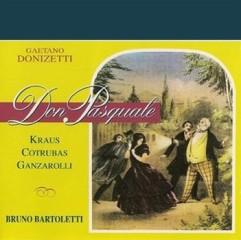Gaetano Donizetti - Don Pasquale (1995)
Gaetano Donizetti - Don Pasquale (1995)

CD 1 1. Sinfonia 2. Act I: Son nov'ore; di ritorno il Dottor 3. Act I: Bella siccome un angelo 4. Act I: Son rinato. Or si parli al nipotino 5. Act I: Prender moglie? 6. Act I: Due parole ancor di volo 7. Act I: Quel guardo il cavaliere 8. Act I: So anch'io la virtù magica 9. Act I: E il Dottor non si vede! 10. Act I: Pronta io son; pur ch'io non manchi 11. Act I: Vado, corro al gran cimento 12. Act II: Povero Ernesto! Dalla zio cacciato 13. Act II: Cercherò lontana terra 14. Act II: Quando avrete introdotto CD 2 1. Act II: Non abbiate paura, è Don Pasquale 2. Act II: Fra da una parte eccetera 3. Act II: Indietro, mascalzoni, indietro 4. Act II: Un uom qual voi decrepito 5. Act II: Riunita immatinente la servitù 6. Act III: I diamanti, presto, presto 7. Act III: Signorina, in tanta fretta 8. Act III: Parto adunque... 9. Act III: Che interminabile andirivieni! 10. Act III: Questa repentina chaiamata 11. Act III: Cheti cheti immantinente 12. Act III: (Aspetta, aspetta, cara sposina) 13. Act III: Com' è gentil la notte a mezzo april! 14. Act III: Tornami a dir che m'ami 15. Act III: Eccoli: attenti ben 16. Act III: Tutto dimentico, siate felici Don Pasquale: Wladimiro Ganzarolli Norina: Ileana Cotrubas Ernesto: Alfredo Kraus Dottor Malatesta: Vicente Sardinero Un notaro: Richard Sutliff Orchestra and Chorus Lyric Opera of Chicago Bruno Bartoletti - conductor Rec. live at the Lyric Opera Chicago 2 Nov. 1974
Don Pasquale is one of the great masterpieces of Italian comic opera, ranking with Rossini's Il barbiere di Siviglia and Verdi's Falstaff. The premiere took place at the Théâtre Italien in Paris, on January 3, 1843. Later that spring it appeared first at the Teatro alla Scala of Milan, then at the Kärntnertortheater in Vienna, and finally at Her Majesty's Theater in London. Although Donizetti was reputed to have finished this, his 64th opera, in a mere two weeks, it was hugely successful at each of these venues and gained rapid recognition throughout Europe. It was first heard in New York City in 1846 and has enjoyed unflagging popularity worldwide ever since.
The charming libretto, which revolves around the elderly Don Pasquale's ill-fated foray into marriage with a young girl, is by Giovanni Ruffini, but is more properly considered a collaborative effort between him and the composer. Ruffini (who narrowly avoided death by escaping from an Italian prison, where he was to be put to death for "revolutionary" activities), wrote the original libretto for Donizetti in Paris, basing his story on Angelo Anelli's earlier libretto for Stefano Pavesi's opera, Ser Mercantonio. However, Donizetti (who often wrote his own comic libretti) made such substantial changes to the text during composition that Ruffini refused to sign his name to the finished product. As a result, the authorship of the libretto was for some years in question.
The score to Don Pasquale is often described as Mozartean, and while its affect is clearly of the nineteenth, rather than eighteenth, century, it does recall the earlier master's ability to create vivid characterizations within a taut musical framework. Donizetti also succeeds in humanizing his subjects without ever sacrificing a light-hearted spirit of comedy. Norina is an especially gratifying character, both a strong-willed comic heroine and a sympathetic lover. She is full of intelligent wit, humor, tender sensibilities, and charm. The character of Don Pasquale, the rich bachelor determined to sire his own heirs at the age of 70, offers rich food for comedy without ever sacrificing his overriding sympathy. In each case, characters' emotions are skillfully delineated by musical style and texture: dramatic declamation, patter music, expressive roulades, and tender lyricism blend seamlessly.
The second act is rightfully considered one of Donizetti's finest achievements. Still following the traditional divisions of number opera, it proceeds with such natural pacing and dramatic progression that it seems to form one through-composed gesture. It begins as a trio, as Norina and Doctor Malatesta arrive at Don Pasquale's house. Patter dialogue between the two men contrasts with the nervous melodic outpourings of Norina, who sings first in staccato notes, then in dotted rhythms, and finally in irrepressible roulades. When Ernesto enters, he is given heroic declamatory vocal lines. The conclusion of the resulting quartet is delightfully various and complex, with each character maintaining his or her particular musical identity while contributing to overall effect.
Other memorable moments from Don Pasquale include the scheming Dr. Malatesta's aria, "Bella siccome un angelo," which has become a lyrical centerpiece of the baritone repertory, Don Pasquale's delightful "Un foco insolito," and Norina's cavatina, "Quel guardo, il cavaliere...So anch'io la virtù magica." Throughout the score, Donizetti succeeds in matching the wit and humor of the score with musical invention. ---Rovi
download: uploaded anonfiles yandex 4shared solidfiles mediafire mega filecloudio
Last Updated (Thursday, 31 October 2013 23:16)








